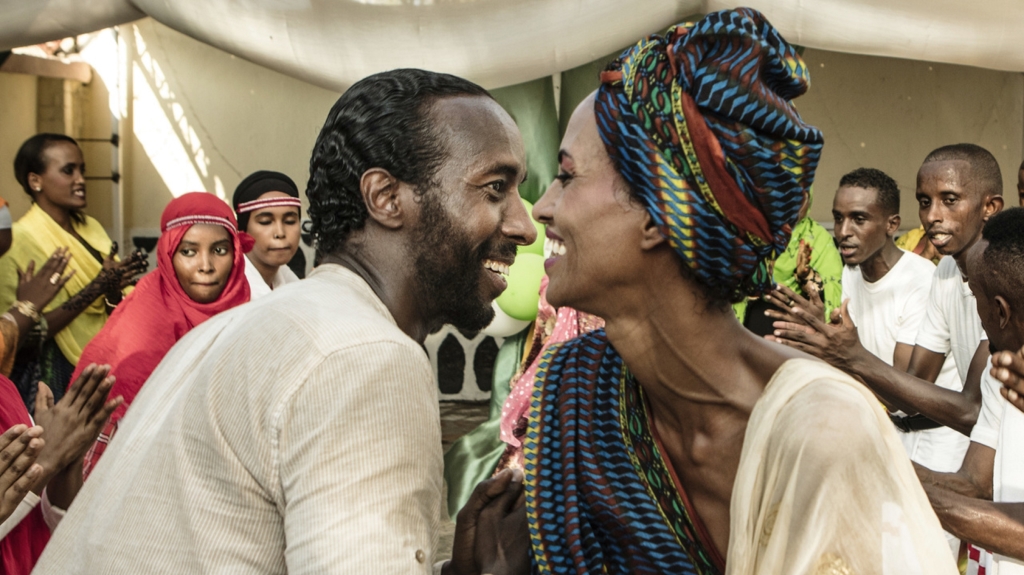In his feature debut, young Somali filmmaker Hader Aydaros Ahmed portrays Senegalese master Osmane Sembene as Sembene handles intimate and social issues and concerns from a very simple plot. A light story that may prompt some to think that the director lacks the courage to speak about his country’s problems. But Aydarus Ahmed’s film is full of emotions, and the director cannot talk too much about emotions without being soft and intimate.
Gouled (Omar Abdi) and Nasra (Yasmine Abshir Arsam) are a beautiful, deeply in love couple who live on the outskirts of Djibouti City with their teenage son Mahad (Kadar Abdelaziz Ibrahim). Nasra urgently needs surgery to treat a kidney infection. Gouled works as a gravedigger to help support his family’s expenses, but he and his son struggle to get the money they need to save Nasra through loans, various jobs, and even from a distant family The contrasting atmosphere and colors of day and night bring the characters to life, and the natural setting perfectly conveys the drama. Day by day, film footage chronicles the search for a family with great adaptability. Despite his sadness, Aidarus Ahmed never sheds tears, but in every scene he imbues his characters with great humanity. Even the sight of gravediggers waiting at the hospital gates to collect money for someone’s death is shown mercilessly. Dusty scenes and happy scenes, balanced between frustration, pain, and dignity that all the characters have. Aidarus Ahmed captures the humanity of every moment, his characters are beautiful, lovable and tender, he portrays them with love.
Although the film is very linear, shot with precise precision and there is no room for error, this method, always dangerous in cinema, presented here by the director in a positive way, made us accept it without difficulty . The film is haunting, from the crowded streets and suburbs of Djibouti to the semi-desert natural expanse that accompanies Gouled’s scenes as he wants to return to the village where he was born and raised in search of help. A sense of purity and serenity prevails over us throughout the film, even in the harsh and brutal final scenes where the intimate balance gives way to a symbolic final scene. The Gravedigger’s Wife is a simple film with a low budget but great human and cinematic quality. A rare cinema from a country that rarely offers films.
“Swimming in the mountains”: a journey
In January 2019, after the death of his mother Iracema, Karim Ainous decided for the first time to travel to his father Majid’s homeland in Algiers to re-establish his history, learn about the place and learn more about his origin. What at first seemed like a video clip of this journey, which started on a ship at sea and then from the capital of Algeria to its remote mountains to discover its origins, became an existential mirror of possible paths that life can take. . The film consists of different scenes shot by the director himself in three layers. The physical time in which the director travels to Algiers that he does not know, the psychological time in which he returns to the memory of the family, and the emotional time that is present when he talks to his mother in the present time, which it’s like being next to him.
The film is a journey, not a film crew. Only the director and the camera in hand portray his country and the faces of his children. Gradually, he began to feel at home, delving deeper into idiosyncrasies and habits and giving people the opportunity to testify in front of the camera. Along the journey, where Ainous went to a small town in the region of Kabylia, where his father belonged and where distant relatives still lived, who did not know of his existence, told us The story of his mother and father is sweet in his voice. , how they met, their love, their travels, the move to Brazil and many special situations that influenced his childhood and the relationship between his mother and father. Karim studies his voice, asking questions and talking to his father. He examines the political, social and mythological Algeria and Brazil between the past and the present. Throughout the film, Ainous reconstructs the history of his parents. He did it not in chronological order, but disturbingly, but effectively. The technical limitations of this film are not scary, but Einous, in his experience, knows exactly what he wants from them, because the picture ends up capturing the experience. What makes Swimming in the Mountains different is that Einous’ film is as personal as it is global, encountering important themes from twentieth-century history and its effects in the twenty-first, between Algeria, Colorado, Paris , Brazil, military dictatorships and the Algerian War of Independence.
Einous feeds the film with dreamy clips and puts before him and us the visions of an alternative life of places, people, languages and histories to give an experimental breeze to the whirlwind of the documentary excursion. He oscillates between intimate meditation, historical analysis, and his message to his mother, his absent companion on this expedition. “Voyage to the mountains” is covered with fantasies, abstractions, speculations, assumptions, deep desires, the need to express them, a personal search for a family going through a geographical and historical path. Few films reconcile the relationship between possibility and immediacy, between cinema and lived reality. The cinema of Karim Einous moves across the cinematic horizon and coordinates these relationships. The filmmaker’s cinematic identity documents itself, transcends possibilities, and oscillates between an overflowing past and an elusive present. Karim Inous always turns to cinema when reality turns his back. Therefore, in the movie, he runs away from his father’s village without saying goodbye to anyone. He took refuge in his cinema, in a painting where he could rebuild what was broken and find a home for his memory.
Source: Al-Akhbar
